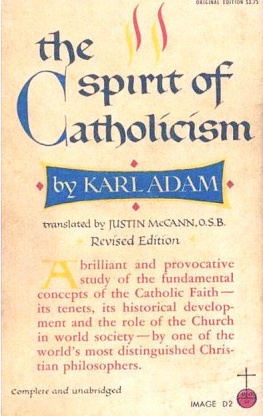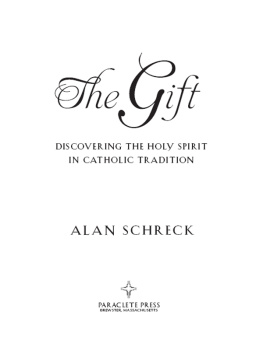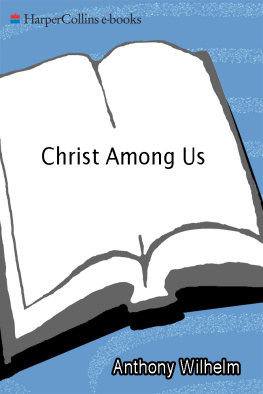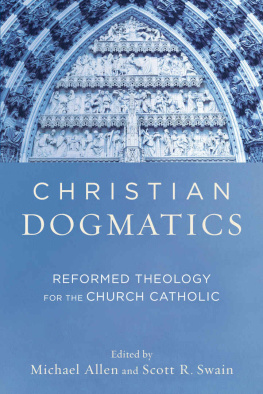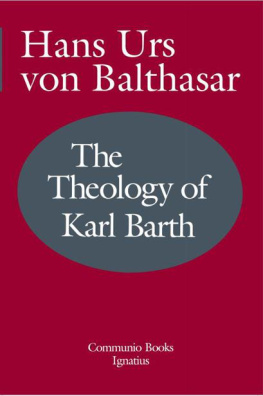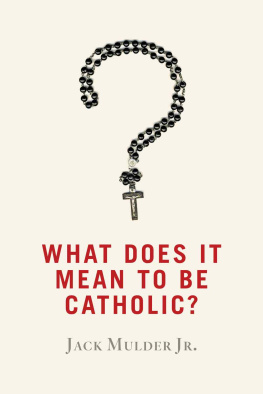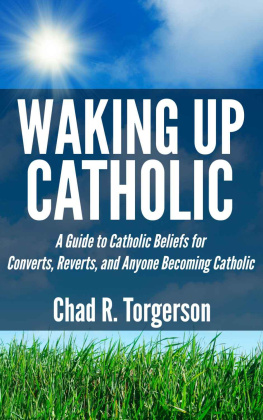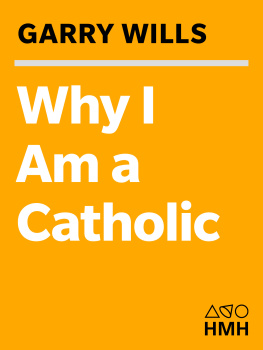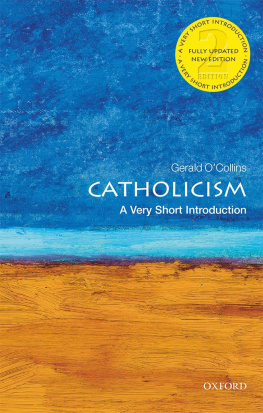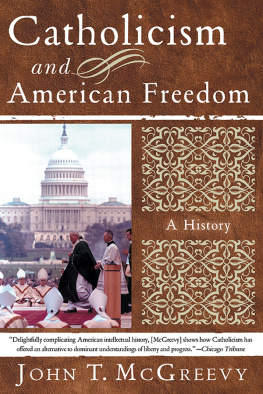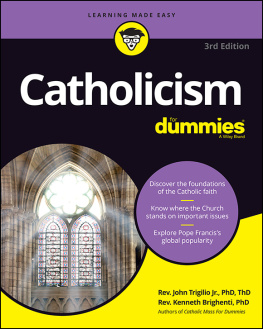Karl Adam - The Spirit of Catholicism
Here you can read online Karl Adam - The Spirit of Catholicism full text of the book (entire story) in english for free. Download pdf and epub, get meaning, cover and reviews about this ebook. year: 1997, publisher: Herder Herder, genre: Science. Description of the work, (preface) as well as reviews are available. Best literature library LitArk.com created for fans of good reading and offers a wide selection of genres:
Romance novel
Science fiction
Adventure
Detective
Science
History
Home and family
Prose
Art
Politics
Computer
Non-fiction
Religion
Business
Children
Humor
Choose a favorite category and find really read worthwhile books. Enjoy immersion in the world of imagination, feel the emotions of the characters or learn something new for yourself, make an fascinating discovery.
- Book:The Spirit of Catholicism
- Author:
- Publisher:Herder Herder
- Genre:
- Year:1997
- Rating:3 / 5
- Favourites:Add to favourites
- Your mark:
- 60
- 1
- 2
- 3
- 4
- 5
The Spirit of Catholicism: summary, description and annotation
We offer to read an annotation, description, summary or preface (depends on what the author of the book "The Spirit of Catholicism" wrote himself). If you haven't found the necessary information about the book — write in the comments, we will try to find it.
The Spirit of Catholicism — read online for free the complete book (whole text) full work
Below is the text of the book, divided by pages. System saving the place of the last page read, allows you to conveniently read the book "The Spirit of Catholicism" online for free, without having to search again every time where you left off. Put a bookmark, and you can go to the page where you finished reading at any time.
Font size:
Interval:
Bookmark:
The Spirit of Catholicism
Karl Adam
Forward
Karl Adam, one of the greatest of living theologians, was born in Bavaria in 1876, one of a family of ten. He received his education at the Classical Gymnasium at Amburg; the Philosophical and Theological Seminary at Regensburg; and received his Doctorate at the University of Munich in 1904. He was ordained to the priesthood in 1900 and spent the following two years doing parish work. His scholarly and theological interests soon became apparent and it was to this field that he naturally turned. In these early years his writing was specialized and was concentrated on the history of dogma. These earlier specialized works have never been translated but have been described by scholars in the field as outstanding.
In 1915 he became a professor at Munich and two years later assumed the Chair of Moral Theology at Strasbourg. In 1919 he went to the University of Tuebingen to take over the Chair of Dogmatic Theology. It was at Tuebingen that he delivered the famous lectures on the Church which brought him world-wide fame. He is also considered an outstanding authority of the theology of St. Augustine and is known for his great love for tradition and the Fathers of the Church.
His eminent position in the field of theology has been recognized for many years but his unswerving fidelity to his beliefs has often led him into great difficulties. A man of great dynamic force and personality, his style captivates readers and listeners alike, but any attempt to compromise or transmute his faith results in a forceful roar of protest.
In 1934 his integrity compelled him to deliver an outspoken denunciation of the so-called German religion in an address on The Eternal Christ which led him into difficulties with the Nazi government. He was threatened with physical harm, his house was riddled with bullets, his life was threatened and his right to lecture was denied him. So strong were the feelings that he aroused that he was forced to flee to the Bishop of Rottenburg for protection. Despite all such threats and attempts at intimidation he steadfastly clung to his position, refusing to compromise what he believed were basic truths.
His writings have all revolved around the necessity for an understanding of our relationship with Christ Himself with particular stress on the doctrine of the Mystical Body. He feels strongly that the doctrine of the Mystical Body is particularly suitable to the problems of our modern day, when mankind is desperately seeking a principle of unity. He constantly stresses this approach for a solution of world problems and just as categorically condemns mankinds reliance on purely human or material bonds of unity.
It is this stress upon the common meeting place of all mankind which has resulted in his strong appeal to non-Catholics. For years he has been tremendously interested in and has been working tirelessly for a union of Christian faiths in one faith. This theme runs through all of his books. Even his earlier limited works such as Tertullians Conception of the Church and Eucharistic Teaching of St. Augustine reflected this concern. His later books, Christ Our Brother, The Son of God, The Spirit of Catholicism and One And Holy were increasingly preoccupied with this all important phase of mans life on earth.
Of all his books The Spirit of Catholicism has probably been his most influential. Originally published in Germany in 1924, it has been translated into French, Spanish, English, Italian, Portuguese, Polish, Dutch, Hungarian, Latin, Chinese and Japanese. Since publication in the United States it has appeared in eleven printings.
The Spirit Of Catholicism was written to provide a calm, dispassionate, clearly written consideration of the fundamental concepts of the Catholic faith which would explain to all, Catholic and non-Catholic alike, exactly what the Catholic Church is. Karl Adam has brilliantly succeeded in achieving his purpose and The Spirit of Catholicism now stands as one of the finest introductions to the Catholic faith written in this century.
Analytical Contents
Chapter I: Introductory
An investigation into the fundamental nature of an infinitely various yet unitary thing. Not to be achieved without genuine sympathy and Catholic experience. Remarkable present-day interest in Catholicism. Two reasons for it: the imposing fact of the Church, the moral and intellectual needs of the modern man. Influential Protestant writers plead for a better understanding of Catholicism. Aim of this book to promote this understanding, in all truthfulness and charity.
Chapter II: Christ in the Church
Intimate union of the Church with Christ. Manifested in her dogma which centers round Christ, in her moral teaching which aims at making men like to Christ, in her worship which is performed through Christ. The sacraments, especially the Sacrament of the Altar, a working of Christ among His people. The same union of the Church with Christ shown in her pastoral and teaching office, in her sacramental doctrine, in her disciplinary authority. The whole structure permeated and bound together by Christ.
Chapter III : The Church the Body of Christ
The Church not merely an invisible kingdom, but also a visible community. Fundamental importance of the community idea. The solidarity of mankind in sin and in redemption a basic conception of Christianity. The organism of the Church represents and enforces that solidarity. A unitary organism with inner differentiation of function. And possessing, of necessity, a visible expression of its unity, a visible head. Essential character of papal and episcopal authority Objections to it on the ground that it is inconsistent with our Lords teaching. In reality a service of the community in His name.
Chapter IV: Through the Church to Christ
The genesis of Catholic faith. Three cardinal points: God, Christ, the Church. The existence of God discernible by natural reason, but His love to be learnt only from revelation. Full faith in God attained by faith in Christ. How is faith in Christ attained? The apostles attained it preparatorily by His personal teaching, fulfillingly by the Pentecostal gift of the Holy Spirit. So we also: preparatorily by the teaching of His living, apostolic Church, fulfillingly by the operation of His grace. Not from lifeless records, but from the living witness of a living organism sustained and animated by Him, from immediate contact with Christ living in His Church. Christianity more than a system of thought: a living stream of divine life flowing out from Christ and bearing His truth and His life, pure and uncontaminated, down the centuries.
Chapter V: The Foundation of the Church in the Light of the Teaching of Jesus
Was the Church founded by Christ Himself, or is it the creation of His disciples? The objection, that our Lords attitude towards Jewish religion and ecclesiastical authority is inconsistent with His foundation of a Church, scientifically untenable. The objections of the eschatological school. Examination of our Lords teaching concerning the coming of the Kingdom and concerning the end of the world. Chronological misconceptions of some of His disciples. The plain teaching of His parables. The foundation of the Church in the direct line of His thought: a Church in gradual process towards perfection and ever ordinated towards a supernatural and other-worldly goal.
Chapter VI: The Church and Peter
Special position of St. Peter among the twelve attested not only by the history of the primitive community, but by the witness of St. Paul. Unsatisfactory theories advanced in explanation of this pre-eminence. The all-sufficient explanation to be found in Matthew XVI, 13-19. This passage no Roman forgery or anti-Pauline interpolation. Significance of its details, especially of Simons new name with its immediate and universal success. Certain that he was given a special authority by Christ Himself. But does this appertain to his successors? The divine intentions of our Lord, the witness of history. The Church based on Peter the only guardian of genuine faith in Christ and the only hope for our civilization.
Next pageFont size:
Interval:
Bookmark:
Similar books «The Spirit of Catholicism»
Look at similar books to The Spirit of Catholicism. We have selected literature similar in name and meaning in the hope of providing readers with more options to find new, interesting, not yet read works.
Discussion, reviews of the book The Spirit of Catholicism and just readers' own opinions. Leave your comments, write what you think about the work, its meaning or the main characters. Specify what exactly you liked and what you didn't like, and why you think so.

